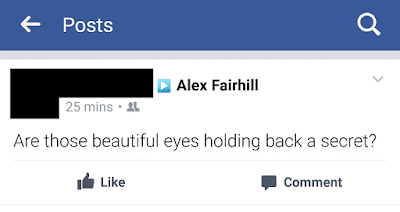This week I was reminded that not all media is social
I’m careful
about how I use social media. I keep my location and other personal details off
Twitter and Facebook, and my personal Facebook page is locked down.
My
writing page is open to anyone, but I still keep certain personal information off
it.
Like
many, if not most, women I receive constant friend requests from men – usually middle-aged,
widowers, American and ex-armed services – because obviously we all have soft
spots for guys who’ve fought for (in this case) another country. Not many posts
on his timeline? He’s new to Facebook, reaching out because he’s alone with no
woman to look after him. Who’s cooking his dinner? Will he remember what day of
the week it is without someone there to remind him? Hmm… maybe I can be the
one to nurture him. Then there’s that post-army pension he’s getting, and he’s
standing on a yacht… You get the idea.
Men,
on the other hand, receive friend requests from women who are barely dressed
and barely adults claiming to be in their neighbourhood, posed seductively in
short skirts and low-cut tops. No gender profiling going on there either.
 |
| This is NOT a come-on. It is vaguely threatening and won't get positive attention. |
Then
there’s the random messages that come through, mainly on Facebook, ranging from
“how are you?” to “Hello, my pretty friend” or “your beauty attracted me and I
think we are soulmates” to more explicit messages. If you send me one of these,
I will block and depending on the content report you.
I let personalised
‘nice to connect with you’ messages or stickers from new friends go, but if you’re
someone I haven’t met in person and keep pushing these, you’re off the list. It
might sound harsh, but for me social media is a space to connect with the
writing community and anything that lessens the enjoyment of that – whether it’s
a direct message hard or soft sell of your online publication or an explicit
come-on – I’m not going to waste my time dealing with that.
This
week I received a friend request from a guy, let’s call him ‘Fred’. His profile
pic was a cartoon character: orange flag. Some of his profile was locked down:
orange flag. Fred had several mutual friends, all writers: big green flag. His listed
job was news director at a major media company. He works in the industry: green
flag.
I
accepted his friend request. A couple of hours later he sent me a waving hello
sticker over Messenger. Annoying, but not uncommon. I ignored it.
Then
Fred posted this on my timeline: “Are those beautiful eyes holding back a
secret?”
This is not flattering. It is creepy as hell. This behaviour makes women feel uncomfortable both in real life and online.
I was
tempted to reply with some pithy remark, but blocked him instead. There was, and I
haven’t been able to ascertain if there still is, a man of the same name
working as news director for the company he listed. Fred also has a LinkedIn
profile – again photo-free – endorsed by three people: a grocery clerk, a real
estate agent and someone connected to a holistic medicine school.
So it’s
looking dodgy. But not as obviously dodgy as some others. It’s unlikely that
this is Real Fred’s weird and whacky way of approaching potential staff (sexual
harassment case, anyone?), and the thought that someone has gone to these lengths
to research and set up or hack a profile that’s believable and is targeting female
writers who may be using Facebook to network is unsettling.
Fred sums
up all that’s wrong with SM. I posted the details in a Facebook group for women
writers for one reason – and it’s the same reason I’m not naming him here – he could
be an actual news director at that media company. And I don’t want to heap crap
on Real Fred when it’s Fake Fred causing the problem.
The
group, meanwhile has demonstrated the positive side of Facebook: a couple of
people who have the connections have offered to try and find out if Fred is who
he says he is, and to also try and contact Real Fred to let him know what Fake
Fred’s been doing.
But we
shouldn’t have to do this. There are specific signs we can look for that signal
a scam: few friends and photos, few if any posts, no interactions, certain
backgrounds and careers. I have no doubt they vary between countries and
demographics, but after you get a couple you cotton on to what’s happening.
As the
scammers – assuming in this case Fred is a scammer/hacker – become more
sophisticated, we need to become more vigilant. From now if it’s not all green
flags, it’s a no from me.
No comments:
Post a Comment